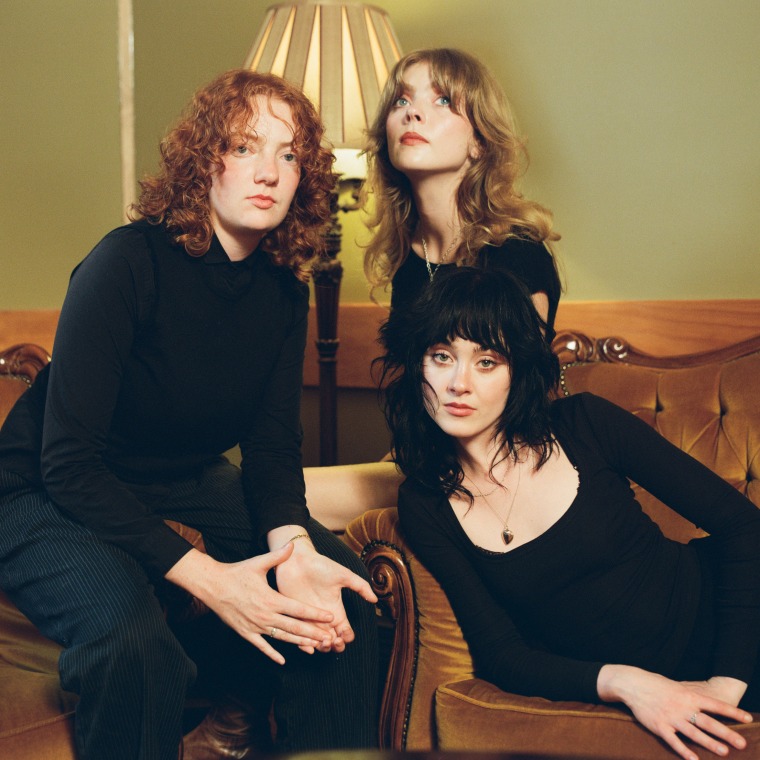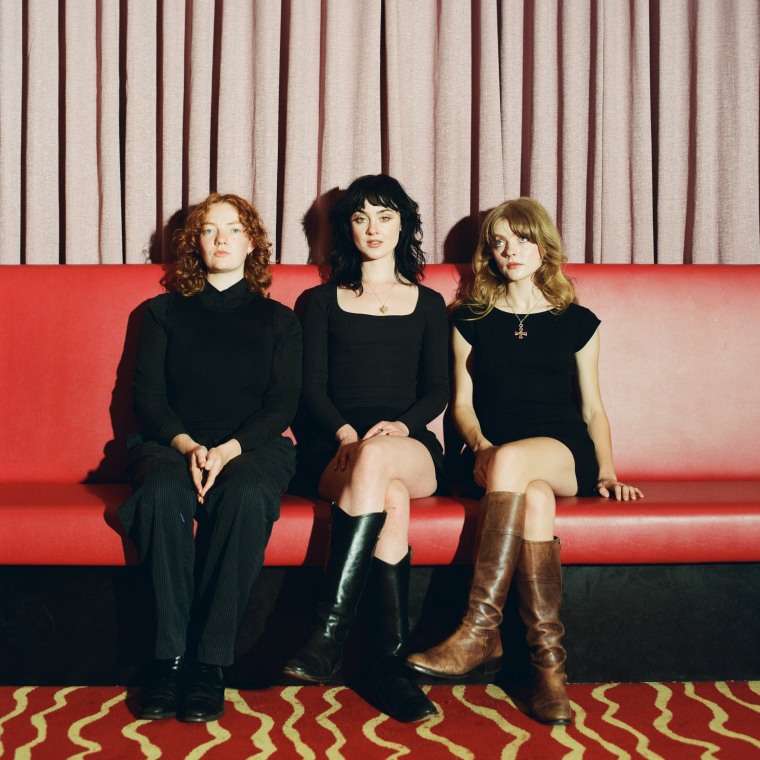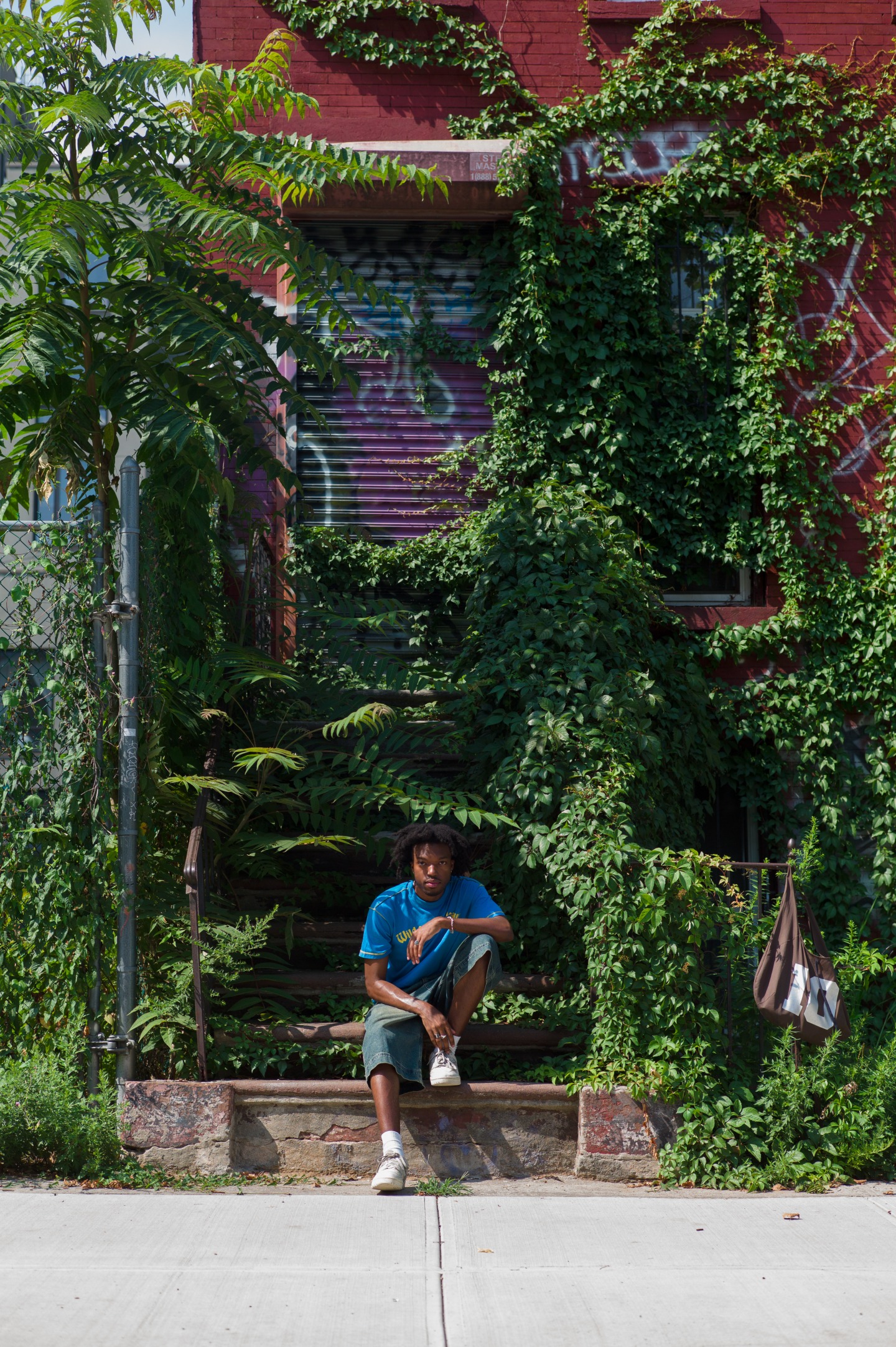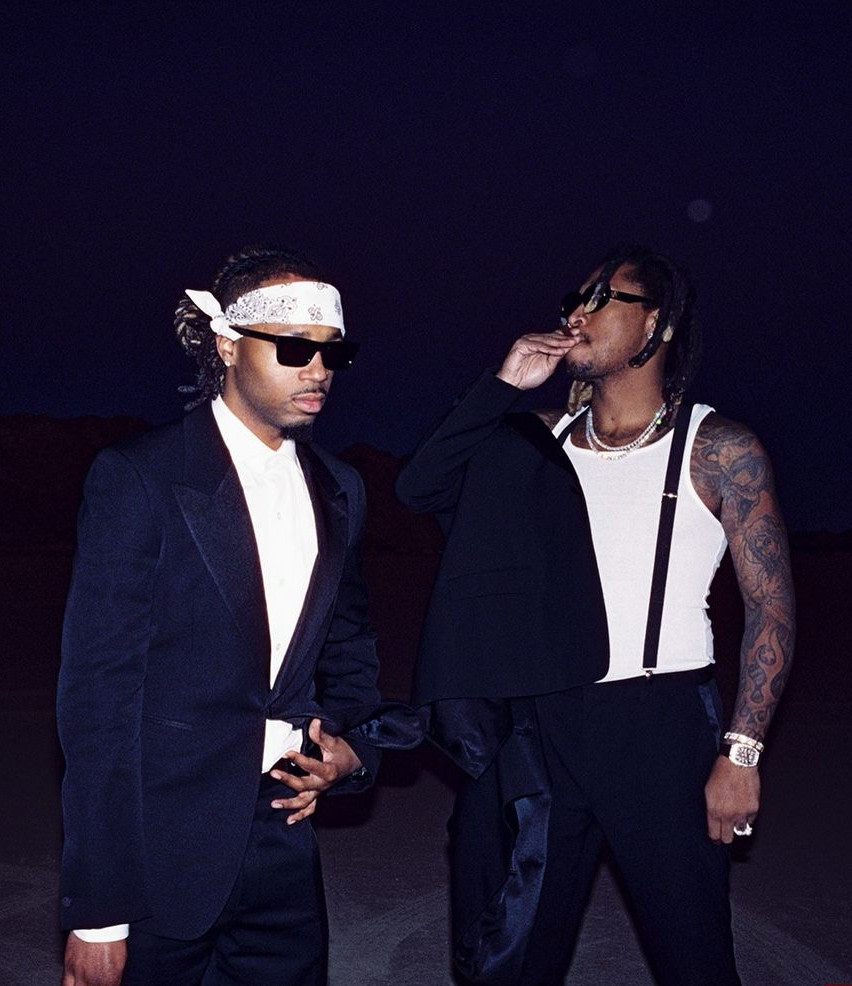Photos by Bridgette Winten
The members of Australian band Folk Bitch Trio are bundled up and reasonably happy about it when I reach them over Zoom in November, a few days after a resoundingly successful set at New York City venue Baby’s All Right. On the day of their show, it snowed for a fleeting few moments, and it pleasantly impressed the group enough that they brought it up on stage. The set was otherwise defined by the hushed silence from the crowd as the band dove headfirst over and over into waves of harmonized vocals.
All three shared lead vocal duties, while members Gracie Sinclair and Jeanie Pilkington alternated with the acoustic and Heide Peverelle held down the rumbling electric. In person, you can see how graceful and organically their vocals weave together, each one a part of the organism that is Folk Bitch Trio.
Calling in from a green room in Montreal, the Melbourne-based trio are four months out from the release of their heavily-praised debut album Now Would Be A Good Time, a spotlight of their often wry and grappling-with-malaise songs. But on the whole, the outlook of Folk Bitch Trio strikes me as pretty sunny. Jeanie Pilkington notes that the first three dates of their U.S. tour promoting the project all sold out. “Two out of the three cities, we’ve never been to, so we don’t really know where they’re coming from, but we’re really happy about it,” she says. “We’re chuffed.”

Photo by Copper Taylor-Bogaars
The FADER: You’ve spent a lot of time this year, literally, on the other side of the world from your home. Does it feel like it?
Heide Peverelle: It does feel far away. But we’ve done a lot of touring this year, and we’ve been to the States quite a few times in the last 18 months. So it feels like every time we come here, it feels less far away. We’ve gotten used to the vibe of America, but I think we’re lucky that we can dip in and out and experience different parts of the country. It’s quite a good anthropological study as well as a job.
When we first came here, I think we all had a bit of culture shock, because for our whole lives, we’ve been fed American media. You have an idea of what it is in your head, and then you get here and you realize it’s not all what you thought. That’s been an interesting thing to notice, I think, for all of us. But we do love touring. It’s a lot of fun, and people really are supportive.
Jeanie Pilkington: America is one thing, and then American crowds, we don’t have anything bad to say about that. They’re fantastic, and they love music.
I did notice there were a fair share of older white guys solo in the crowd at your shows, which I’ve definitely seen at most women or femme alternative artists’ shows.
Pilkington: And their Instagrams are just femme artists; at the front being a punisher to just any women. It’s confronting and disturbing.
But I guess that’s one of the things that makes being a group protective.
Gracie Sinclair: Yeah, we have the power of camaraderie.
Peverelle: Because we’re all doing the exact same thing, we’re all singing, we’re all playing guitar, it is a three headed beast. It’s not like one of us is able to sit back and not experience what the other two are experiencing. So it’s an asset, but it also means that we all experience the bad stuff as well. But you gotta have the good and the bad.
Sinclair: Them’s the breaks.
We have the power of camaraderie. —Gracie Sinclair
How are you feeling about your first time being fully plunged into the music media circus?
Pilkington: We spent a week in Los Angeles and a week in New York, the two weeks surrounding the record release. And we were doing interviews every day and photo shoots every day.
People had this infantilation with our friendship and the intimacy we have with each other. Especially in Europe, press can be really difficult, because you do interviews in Europe and it feels like they’ve never spoken to, let alone interviewed, a woman before, let alone a woman who plays music. It’s a crazy experience, because we concern ourselves so solely with the music and what we’re doing and that being our outlet, that we don’t think about being perceived as three femmes until you’re doing press, and those things are constantly coming up.
It’s honestly so boring. It’s so boring. But I think, once again, we have the camaraderie to laugh at these things with each other, because what else are we supposed to do with that?
Peverelle: We just try to let the weird shit wash over us a bit. We have much more interesting things to concern ourselves with than weird articles about us where it sounds like they’re thinking about us having a little sleepover or something.

A lot of the coverage is talking about you all as “besties” as if that’s the main component. Having seen your live show, I was more struck by the way you perform; it feels like there’s an invisible tether between you when you’re playing together.
Peverelle: We are best friends, and I think what you said there about the tether, it’s totally there, we feel that, and it’s a big part of it. It’s a sacred part. But it’s for us.
There’s always that fascination of what goes on in bands and everything. We’re people who consume media like that, and we read stuff about bands that we’re fans of, and that kind of stuff is interesting, but —
Sinclair: It can detract from the fact that we function together as a very professional, well-oiled machine.
Peverelle: This is our job, this is what we do, and we do it well.
Sinclair: And lots of other bands are probably really good friends. How could you not if you’re touring?
We have much more interesting things to concern ourselves with than weird articles about us. —Heide Peverelle
Your music feels like it wasn’t necessarily made with TikTok in mind, and that’s so many artists’ pathway to success right now. Did you not feel pressure to write songs that would easily lend themselves to becoming a TikTok trend?
Pilkington: It’s not like we wouldn’t welcome that and love that. We’re proud of the product we’ve created, so if millions of people want to consume it, that’s fantastic. But absolutely not. We are concerned with legacy and creating something that is really good. And it’s a whole rabbit hole, and it’s scary, but we’re in it. We’re in it for the long game.
TikTok is this weird thing that has monopolized the industry we work in, and it can be fun. “God’s a Different Sword” has gone “soft viral” but not for any tangible reason. These teenagers are using it to manifest getting a girlfriend or a boyfriend. It’s so bizarre.
As far as Gen Z people go, we’re not really that chronically online, or in those spheres. It’s really scary how many artists are now starting off as internet artists and then transitioning into being in the studio and then touring. It’s — no shade, and everyone’s career is their own, and there’s no wrong way to do things — but never how we wanted to do it.
I think we’re a bit protective of that even being an element. We’ve been playing live shows for five, six years and honing our craft, and it took us a long time to make a record we’re proud of. None of that was concerned with how impermanent that stuff feels.
Finally, you are not the only band I saw this week that brought up [N.Y.C.’s] recent mayoral election. Jeanie, you joked that you thought Zohran Mamdani might show up at Baby’s. For what it’s worth, he spent Halloween weekend stopping by several clubs.
Pilkington: I think it’s a product of political hopefulness. Obviously it wasn’t going to happen, but it’s really beautiful that there’s a world in which we can spin the mayor of New York City being a Folk Bitch Trio fan, because that is not really the case for any other area of American politics.
Peverelle: [That hopefulness] should be there, always. It’s such a big part of what’s going on in the world right now. And if you’re not engaged in it, then you’ve kind of got a bag over your head or something.
Pilkington: But also his marketing was great, the publicity was like, fucking insane. Everyone in Melbourne is talking about it — everyone in the world is talking about it, because it’s the only pinnacle of political hopefulness that seems to have happened recently.




